Publications
This page collects together publications on issues related to women in politics from both the Pacific and the world. It collects together research documents, campaigning resources and key papers. If you have a publication we have missed, please send it to the PacWIP team at pacwip@gmail.com.
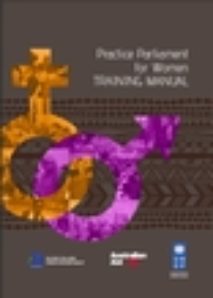
Practice Parliament for Women Training Manual launched
The idea for a Practice Parliament for Women came about as a direct response to the call from women around the Pacific region to be supported, and to have their political and policy skills developed. This initiative drew on the positive experiences reported from youth parliament forums in the region and elsewhere. The Practice Parliaments are designed to fill some of the gaps in the existing efforts to support women’s political participation by developing a broader set of skills and by giving women participants the opportunity to immediately apply those skills. Responding to the success of this initiative, UNDP has produced this publication to provide guidance to national partners on how to organize and run a Practice Parliament for women.
Author: Charmaine Rodrigues
Institution: UNDP Pacific office
Date: May 20, 2021
File size and type: 1.95 MB
Download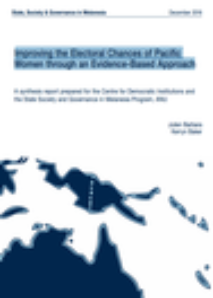
Improving the Electoral Chances of Pacific Women through an Evidence-Based Approach
This report draws on discussions that occurred at a three-day workshop hosted by the Centre for Democratic Institutions (CDI) and State, Society and Governance in Melanesia Program (SSGM) at the Australian National University in Canberra in June 2016. The purpose of the workshop was to review the evidence base regarding lessons learned about successful campaigning, how women are positioned to run successful campaigns, and how development partners might enhance the effectiveness of support provided to women candidates by drawing on and responding to this evidence base. While the workshop focused on the Melanesian context — and Papua New Guinea (PNG), Solomon Islands and Vanuatu, in particular — it drew on lessons from other parts of the Pacific islands region and the findings of this synthesis report may be applicable more widely. The workshop was attended by a broad range of stakeholders, including campaign activists, women candidates, former and current sitting members of legislatures, development partners, NGOs, policymakers and academics from Melanesia and Australia. An annotated copy of the three-day workshop program is provided at Appendix A, with speaker names excluded. Discussions at the workshop were held on a Chatham House basis to encourage frank discussion. While the synthesis provided in this report draws on those discussions, this report reflects the analysis of the authors and should not be taken to reflect the views of attendees at the workshop. This report is supplemented by a series of framing papers which were presented at that workshop to inform focused workshop discussions and have been published as SSGM In Briefs in tandem with this report.
Author: Dr Julien Barbara & Dr Kerryn Baker
Institution: State Society & Governance in Melanesia Project, ANU
Date: May 20, 2021
File size and type: 1.50 MB
Download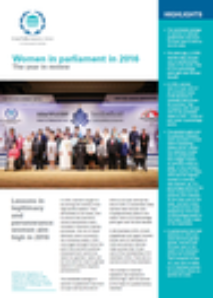
IPU Report – Women in parliament in 2016: The year in review
IPU's annual report provides information and statistics on the state of women's representation in national legislatures around the world.
Author: Dr Sonia Palmieri
Institution: Inter-Parliamentary Union
Date: May 20, 2021
File size and type: 1.10 MB
Download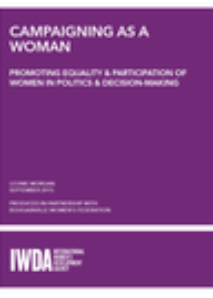
Campaigning as a woman: Promoting Equality and Participation of Women in Politics and Decision-making
Author: Leonie Morgan
Institution: International Women's Development Agency (IWDA)
Date: January 11, 2016
File size and type: 2.07 MB
Download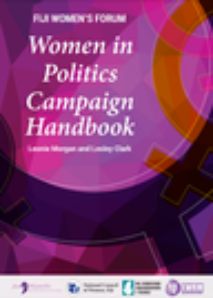
FIJI WOMEN’S FORUM: Women in Politics Campaign handbook
This Handbook was initially prepared as a resource for the Candidate Capacity Strengthening Workshop organised by the Fiji Women’s Forum in June 2014. The aim of the Workshop was to assist women candidates to campaign effectively for the September 2014 Fiji election. Following the election, the Handbook was reviewed and case studies added based on the campaigning experience of the various women candidates. The Handbook includes comments from participants at a debriefing session following the 2014 elections, and candidates interviewed by a Fiji Women’s Rights Movement researcher after the election. It also includes extracts from interviews with Members of Parliament undertaken by FemLINKPACIFIC following the election. The Handbook provides useful tools and includes practical advice, checklists and questionnaires covering all the key components for a successful election campaign. It is hoped that women candidates in future Fiji elections and those in other Pacific elections will find this Handbook a useful resource to help them develop and implement their own winning campaign strategies and plans.
Author: Leonie Morgan and Lesley Clark
Institution: Fiji Women's Forum
Date: January 11, 2016
File size and type: 9.58 MB
Download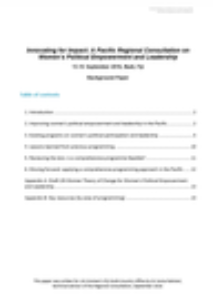
UN Women Background Paper : Pacific Regional Consultation on Women’s Political Empowerment and Leadership
This paper was written by Dr Sonia Palmieri as a Background Paper to help guide discussions at the Pacific Regional Consultation on Women’s Political Empowerment and Leadership. The meeting was convened by UN Women, in partnership with UNDP, and held in Nadi, Fiji. It had 3 objectives, namely to: (i) critically review previous and current programming to advance women’s political participation in the Pacific; (ii) agree on a comprehensive, coordinated programming framework that reflects national context and priorities; (iii) bring together key actors and stakeholders and consolidate partnerships for comprehensive programming on women’s political empowerment and leadership.
Author: Dr Sonia Palmieri
Institution: UN Women
Date: May 20, 2021
File size and type: 890.81 KB
Download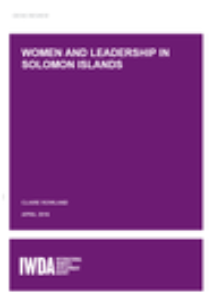
Women and Leadership in Solomon Islands
This desk review on ‘Women and leadership in Solomon Islands’ was commissioned to assist IWDA to reflect on the potential direction, approach and suitable partnerships for the FLOW program development in Solomon Islands. Drawing from journal articles, local news reports and grey literature, this review has sought to address key questions, including: (i) What are the enablers and barriers to women’s (and young women’s) political leadership and participation in Solomon Islands? (ii) What are the avenues for women’s leadership outside of formal politics? How are these roles and opportunities perceived? (iii) What work is being undertaken by CSOs/women’s networks and agencies in Solomon Islands to promote leadership? (iv) What lessons have been learned from existing women’s leadership programs in Solomon Islands that can be drawn from in the development of new programs?
Author: Claire Rowland
Institution: International Women's Development Agency
Date: January 4, 2016
File size and type: 187.51 KB
Download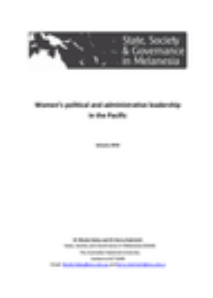
Women’s political and administrative leadership in the Pacific
This paper provides an overview of women’s political and administrative leadership in the Pacific. It has been prepared to inform forthcoming design work being undertaken by Pacific Women. The paper incorporates and expands upon an earlier concept note we prepared to inform the original Pacific Women design (Haley and Zubrinich 2012), and considers women’s leadership and participation as it relates to formal institutions and processes, including national and subnational government, the public sector and civic engagement.
Author: Dr Nicole Haley & Dr Kerry Zubrinich
Institution: State Society & Governance in Melanesia Project, ANU
Date: November 1, 2016
File size and type: 789.47 KB
Download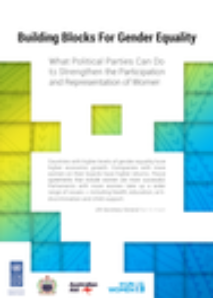
Building Blocks for Gender Equality: What political parties can do to strengthen the participation and representation of women
The United Nations Development Programme (UNDP) and UN Women, in partnership with the governments of Samoa and Australia, advocate for women’s political rights and through the implementation of the Increasing Political Participation of Women in Samoa (IPPWS) programme are providing training for those women who want to run for office. IPPWS’ trainings aims at supporting women to overcome the barriers they face by strenghtening their skills to exercise leadership and contribute to political life for the benefit of the entire nation.As part of the programme, UNDP and UNWomen launched a handbook titled “Building Blocks for Gender Equality: What Political Parties Can Do to Strengthen the Participation and Representation of Women.” The publication was written by Elizabeth Weir, Canadian national and senior international parliamentary expert, that is also facilitating the IPPWS trainings in Samoa. The publication identifies targeted interventions for promoting the stronger presence and influence of women in political parties. It highlights the benefits for the parties of taking action on Gender Equality, indicate effective measures for ensuring women’s participation in the operations of the party and provide ideas on how to offer financial and mentoring support to candidates during the election process.
Author: Ms. Elizabeth Weir/UNDP Samoa MCO
Institution: Increasing Political Participation of Women in Samoa. UNDP Multi-Country office, Samoa.
Date: April 12, 2015
File size and type: 1.07 MB
Download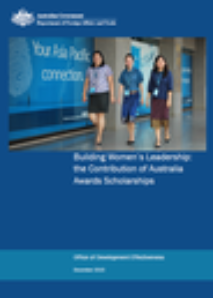
Building Women’s Leadership: the Contribution of Australia Awards Scholarships
Since the 1950’s Australia has provided scholarships for men and women from developing countries to study at Australian tertiary institutions to ‘develop leadership potential’. Recipients are expected to ‘make a significant contribution to their home countries as leaders in their field’, and be part of an ‘engaged and influential global network of leaders, advocates and change-makers’. The Office of Development Effectiveness evaluated the contribution that scholarships make to women’s leadership. The evaluation included interviews, a document review, and a global analysis of tracer studies in which scholars are asked about experiences and outcomes after completion of their scholarship.
Actions needed to improve women’s leadership outcomes from scholarships were identified. The evaluation found that: Most women are employed after returning home; Just over three quarters of women report having greater operational or technical responsibility, and just over half report having greater financial responsibility within the first three years of return from a scholarship; Most women move into higher positions after their scholarships; Almost all women and their supervisors felt that scholarships contributed to a great or medium extent to professional advancement.
Author: Review Report - Briefing Note
Institution: Office of Development Effectiveness, AusAID/DFAT
Date: January 12, 2015
File size and type: 1.99 MB
DownloadAuthor: Review Report - Full Report
Institution: Office of Development Effectiveness, AusAID/DFAT
Date: January 12, 2015
File size and type: 1.87 MB
Download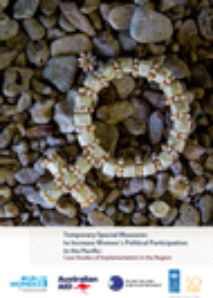
Temporary Special Measures to Increase Women’s Political Participation in the Pacific: Case Studies of Implementation in the Region
This report captures the high quality discussions of the "Pacific Regional Conference on Temporary Special Measures", held in Port Moresby in November 2015. This conference was a joint initiative of UNDP, the Pacific Islands Forum Secretariat and UN Women’s Multi-Country Office in Fiji, with the financial support of the Australian Aid program.
Author: Sonia Palmieri
Institution: UNDP / PIFS / UNWomen
Date: May 20, 2021
File size and type: 1.65 MB
Download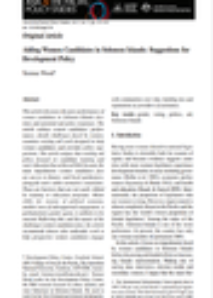
Research: Aiding Women Candidates in Solomon Islands: Suggestions for Development Policy
This research by Terrence Wood discusses the poor performance of women candidates in Solomon Islands elections and potential aid policy responses. The article outlines women candidates’ performance, details challenges faced by women, examines existing aid work designed to help women candidates and provides policy suggestions.
The article argues that existing aid policy focused on candidate training and voter education has achieved little because the main impediments women candidates face are access to finance and local gatekeepers, alongside more subtle normative constraints. These are barriers that are not easily shifted by training or education programs.
Meanwhile, for reasons of political economy, another area of aid-supported engagement, a parliamentary gender quota, is unlikely to be enacted. Reflecting this, and the nature of the challenges women candidates face, the article recommends donors also undertake work to help prospective women candidates engage.
(Source: Wiley Online Library, Asia & the Pacific Policy studies)

